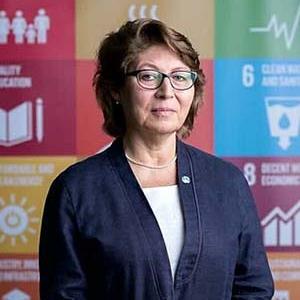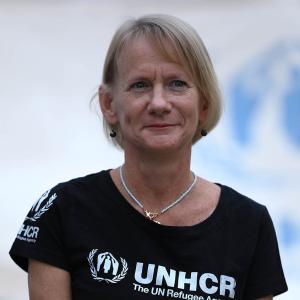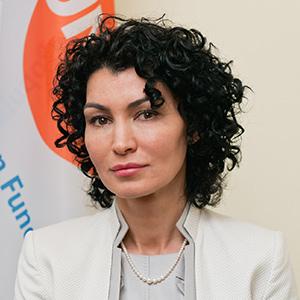COVID-19 exacerbating gender-based violence in Iraq
25 November 2020
This year, the world marks the 16 Days of Activism against Gender-Based Violence (GBV), which starts on November 25, in unprecedented circumstances.

The COVID-19 pandemic required governments to enact life-saving public health measures, including lockdowns, curfews and other restrictions on movement, to contain the spread of the virus. For women and girls, however, such measures can also be sources of increased risk of violence and loss of life.
Recent global and regional reports have shown an alarming increase in GBV cases during the pandemic, in particular domestic violence. Many of the measures necessary for controlling a viral outbreak have also significantly limited the ability of survivors to shield themselves from their abusers, or access support mechanisms.
Iraq is no exception. The GBV Information Management System (GBVIMS) has recorded a marked rise in the number of reported incidents of violence in 2020. Domestic violence accounted for more than three-quarters of all reported GBV incidents. Given that Iraqi women and children - especially those with disabilities - were already exposed to high levels of risk of domestic violence pre-pandemic, these figures are only the tip of the iceberg, considering that a large portion of incidents are not reported.
While we commend its efforts to end gender-based violence, we call on the Government of Iraq to address the root causes of violence against women and children and to promote women’s leadership and participation in decision-making, including during times of humanitarian crisis and emergency. GBV prevention, risk mitigation and responsive actions should remain the most urgent priority, as many women and girls continue to be a target of violence and abuse suffering from the lack of legislation that can protect them and hold perpetrators accountable.
We urge the Government and Parliament of Iraq to end GBV, to hold perpetrators accountable, to create protective spaces and environments where survivors of GBV feel safe and empowered and can thrive.
We pledge to keep working together, as One UN, with the Government of Iraq and the Kurdistan Regional Government, civil society, the international community and all partners to ensure the protection of women and children across Iraq.
This includes strategic development and leadership on the human rights and protection priority areas in Iraq, including: early warning, prevention and protection of human rights in situations of conflict and insecurity; strengthening rule of law and accountability for human rights violations; child protection; conflict related sexual violence; enhancing equality and countering discrimination; enhancing and Protecting Civic Space and People’s Participation. Ms. Bell holds a MSt. in International Human Rights Law from the University of Oxford and MA and BA degrees (distinction) from the University of Victoria.

Ms. Zorba has been serving as UN Women Iraq Country representative since February 2017, and as Head of Office/Representative in Yemen since December 2014. Before that, between 2005-2014, she served in leading positions with UNIFEM, UNFPA and UNESCO.
Before joining the United Nations, Ms. Zorba had a successful career as a media practitioner, trainer and defender of press freedom, acting as editor-in-chief and publisher of Sharqiyat magazine, published in Jordan. She has also worked with several regional and international UN and other non-profit organizations offering technical support and training to journalists and human rights defenders around the world.
Ms. Zorba holds an MA degree in Business Administration and Management from the American InterContinental University, Illinois, and a BA degree in Economics from the American University of Cairo.

Irena Vojáčková-Sollorano
Ms. Vojáčková-Sollorano holds a Diploma in International Economic Relations from the Diplomatic Academy in Vienna, a Master’s Degree in History, Geography and International Law from the University of Vienna, and a Bachelor’s degree in History, Sociology, Geography and Political Science from the University of Heidelberg in Germany. Ms. Vojáčková-Sollorano is proficient in English, German and Czech.


(Deputy Representative, Baghdad, Iraq from October – December 2019)
Ms. Candler joined UNHCR over 25 years ago in Canberra, Australia. She has since worked for UNHCR mainly in field locations such as Mozambique, Indonesia, Eritrea, Kenya, Sudan and Angola but also at UNHCR Headquarters in Geneva and Brussels. Ms. Candler has held a number of different functions most of which were in the area of refugee protection, although she has also worked with UNHCR’s Inspector-General’s Office. Ms. Candler’s function before moving to Iraq was as UNHCR Representative in Angola. Ms. Candler graduated with an LLB from the School of Oriental and African Studies (SOAS), University of London, and subsequently completed an LLM in Law and Development.

She managed regional and global programmes while working with several governments, development agencies and NGOs.
Prior to joining UNFPA in Iraq, she served as UNFPA Representative to Moldova and Country Director for Albania and was part of UNFPA Regional Office for Eastern Europe and Central Asia’s Senior Management team.
She holds a medical degree a Master’s degree in Public Administration and a Master’s degree in Health Management.




